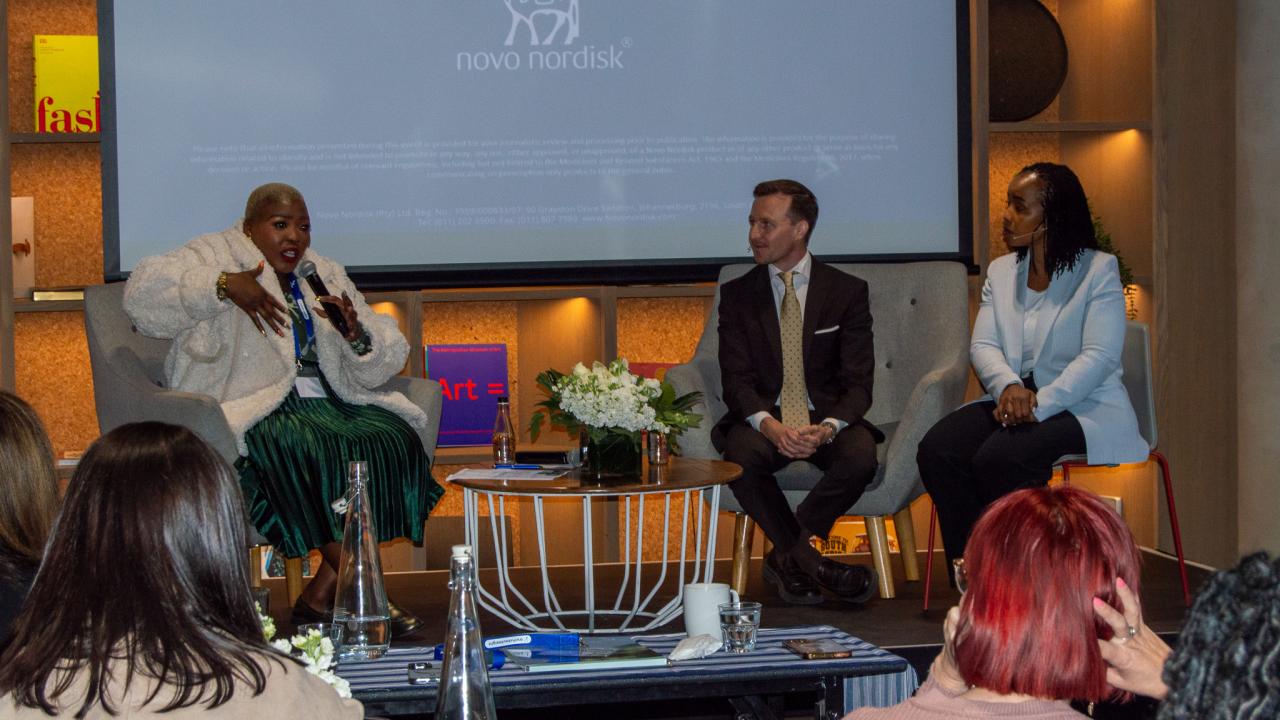
Celeste Ntuli speaking on her journey
South Africa has officially joined the list of countries offering Wegovy (semaglutide 2.4 mg) — the first once-weekly GLP-1 therapy approved locally for chronic weight management in adults with obesity or overweight linked to other medical conditions.
Announced by pharmaceutical company Novo Nordisk on 14 August in Johannesburg, the launch comes at a time when more than 20 million South Africans live with obesity or overweight. According to the World Obesity Federation, adult obesity in South Africa is expected to increase by 20% by 2030, placing additional pressure on an already stretched healthcare system.
Wegovy, which mimics a hormone that regulates appetite, is clinically proven to support sustained weight loss and reduce the risk of cardiovascular events (including heart attacks and strokes) even before major weight loss occurs. For South Africans living with obesity and related conditions, this signals a shift in how the disease is being addressed.
“We see this as a milestone in obesity treatment, but also in changing how people view obesity,” said Sara Norcross, General Manager for Novo Nordisk South Africa. “There’s still a belief that it’s just about willpower. But obesity is a chronic disease, influenced by biology, genetics, environment and more — not just food and exercise.”
Norcross stressed that part of the company’s mission is to help “shift the language and narrative of obesity from shame to care.” This includes educating healthcare providers and the broader public about the complex nature of the condition, as well as the science behind its treatment.
That science is compelling. The SELECT trial, a landmark global study, showed that semaglutide 2.4 mg reduced the risk of major cardiovascular events by 37% within just three months of use. It also cut cardiovascular deaths by 50% within six months, all in people with obesity and pre-existing heart conditions — but without diabetes.
For Dr. Mary Ngome, Senior Director of Medical and Marketing for Novo Nordisk in Africa, the implications are wide-reaching. “This is about more than weight loss,” she said. “It’s about improving quality of life and giving patients a medically sound, sustainable option. We’re bridging the gap between scientific innovation and real-world care.”
The event also spotlighted the human side of obesity. South African comedian Celeste Ntuli, who participated in a conversation on stage, shared her personal journey with body image, self-worth and societal pressure.
“I’ve been big all my life,” she said, “and I used to think something was wrong with me. But over time I realised — haibo, girl — this is who I am. And I’m beautiful.”
Ntuli’s reflections struck a chord. She spoke openly about learning to accept her body, even when the world suggested she shouldn’t. “People think if you have a trainer, you’re fancy,” she joked. “Me? I go to the gym, get a smoothie, and walk right out.”
Her honesty brought humour and heart to the conversation. She also addressed the emotional burden many people carry when struggling with weight. “You feel guilty when you eat late, when you don’t exercise, when your knees hurt. But I’ve learned to give myself grace,” she said.
This idea of compassion both from within and from the healthcare system was echoed by several attendees. Clinical dietitian Ria Catsicas reminded the audience that successful obesity management must go beyond quick fixes and trendy diets. “This is about balance, long-term behaviour change, and a better understanding of how the body works — including how it resists weight loss,” she explained.
Known as metabolic adaptation, this biological response causes the body to slow metabolism and increase hunger signals when it senses weight loss. It’s a survival mechanism, not sabotage.
For Dr. Nomathemba Chandiwana, Chief Scientific Officer at the Desmond Tutu Health Foundation, the link between obesity and other non-communicable diseases makes treatment access a matter of equity. “Women in South Africa are disproportionately affected by obesity,” she said. “We need policies that treat obesity not as a moral issue, but as a healthcare priority.”
Novo Nordisk’s broader goal in Africa includes driving access, education and systemic change. Malika de Maillard, Head of Business Area Africa, believes that innovation must be matched with collaboration. “We can’t work in silos. We’re engaging with regulators, ministries, and patient communities to ensure this treatment reaches the people who need it most.”
Beyond the medical and policy conversations, Wegovy’s arrival brings an opportunity for culture to shift too. As Ntuli said, “I’m not waiting to reach some magical number on the scale to love myself.”
Her story resonated as a reminder that people deserve dignity and care regardless of their size and that real health change begins with empathy, not judgment.
With one of the highest obesity rates globally, South Africa now has a new tool in its health arsenal. But more than that, the conversation around obesity is finally expanding to include science, compassion, and the voices of those who live it every day.
ENDS